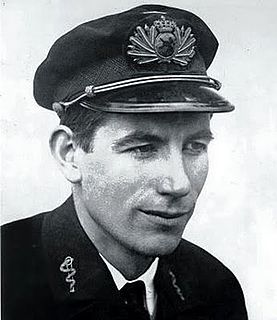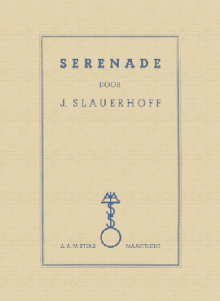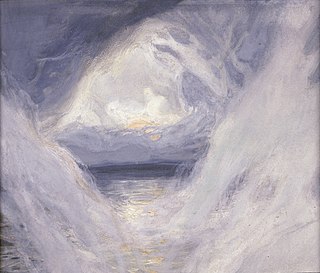
"Wilhelmus van Nassouwe", usually known just as the "Wilhelmus", is the national anthem of the Kingdom of the Netherlands. It dates back to at least 1572, making it the oldest known national anthem in the world. Although the "Wilhelmus" was not recognized as the official national anthem until 1932, it has always been popular with parts of the Dutch population and resurfaced on several occasions in the course of Dutch history before gaining its present status. It was also the anthem of the Netherlands Antilles from 1954 to 1964.
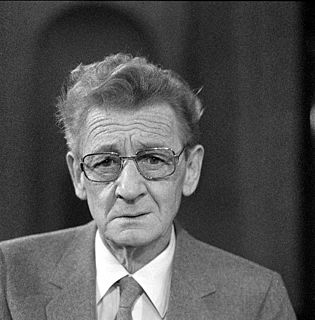
Simon Carmiggelt was a Dutch writer who became a well known public figure in the Netherlands because of his daily newspaper columns and his television appearances.
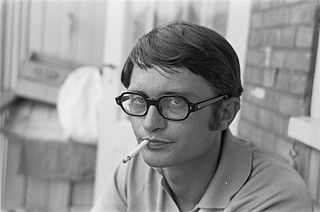
Remco Campert is a Dutch author, poet and columnist.

Theodor Holman is a Dutch journalist, presenter, and writer of Indo descent.
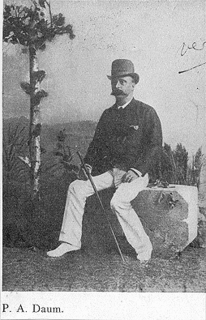
Paulus Adrianus Daum, more commonly known as P. A. Daum, was a Dutch author of Dutch East Indies literature of the nineteenth century.

Liliane Saint-Pierre is a Belgian (Flemish) singer who sings mainly in Dutch.

Adriaan Roland Holst was a Dutch writer, nicknamed the "Prince of Dutch Poets". He was the second winner, in 1948, of the Constantijn Huygens Prize. He was nominated for the Nobel Prize in Literature.
Wim Franken was a Dutch composer, pianist and carillonneur.
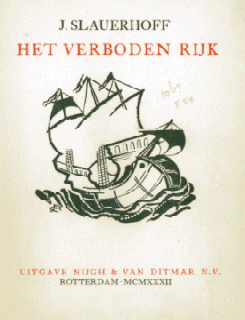
Het verboden rijk is a novel by Dutch author J. Slauerhoff (1898–1936). First published in 1931, the novel follows two narratives simultaneously—that of the Portuguese poet Luís de Camões, and that of a 20th-century Irishman, a radio operator and sailor. A sequel, Het leven op aarde, was published in 1933; a third book was planned but never finished.

Lennaert Herman Nijgh was a Dutch lyricist. Nijgh was most commonly known as the lyricist for Boudewijn de Groot.

Eldorado is a volume of poetry by Dutch poet J. Slauerhoff. First published in 1928, the collection gathers poems that speak mostly of sailors' and pirates' lives and desires. The poems contain familiar themes for Slauerhoff: a sailor's life, the impossibility of life on land or in society, the myth of the pirate and the Flying Dutchman.

Oost-Azië is a volume of poetry by Dutch poet J. Slauerhoff. First published in 1928 under the pseudonym John Ravenswood, the collection contains poems whose theme is the Far East, a part of the globe Slauerhoff knew from his career as a sailor.

Fleurs de Marécage is a collection of French poems by Dutch poet J. Slauerhoff, first published in 1929. Some are poems originally written in French, others are French translations by the poet of his originally Dutch poems.

Saturnus is a volume of poetry by Dutch poet J. Slauerhoff. First published in 1930, the collection gathers the poems earlier published in Clair-Obscur, published by Slauerhoff in 1927 without his editorial oversight, with some additional poems.

Soleares is a volume of poetry by Dutch poet J. Slauerhoff. First published in 1933, and Slauerhoff's next-to-last volume, the poems in this collection center on Latin America and Portugal, and show a resignation or acquiescence not before seen in his poetry.
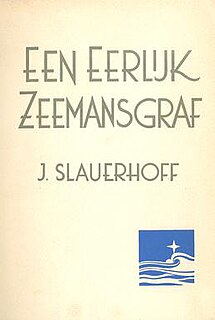
Een eerlijk zeemansgraf is the last volume of poetry published by Dutch poet J. Slauerhoff before his death.

Aart van der Leeuw was a Dutch writer of prose fiction and poetry. His reputation rests mostly on two novels, Ik en mijn speelman (1927) and De kleine Rudolf (1930).
